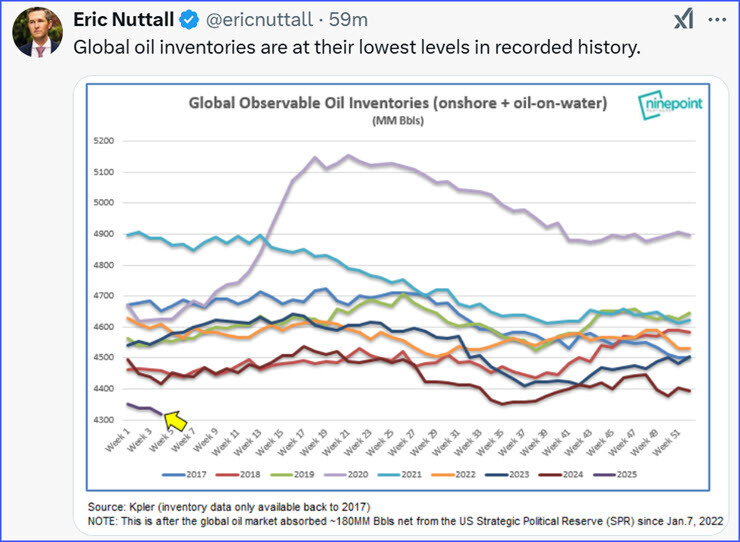Originally published at: https://peakprosperity.com/adam-rozencwajg-peak-oil-arrives-in-the-us-shale-patch-are-you-ready/
The main battle I’ve been fighting in the health space since Covid began is principally one between abstractions and reality. Fighting against me were (are) those who think of their efforts in abstract terms like “the greater good.”
They would say things like “We have to combat vaccine hesitancy in the interest of achieving the greater good.” When pressed for details, the conversation would quickly fall apart.
Is greater good measured in lives saved? What about quality of life? How certain are we that the desired ends aren’t merely being imagined into existence? What data do we have to support the assertions?
Most importantly, how do we compensate the people at the margins who are inevitably going to suffer severe side effects, if not death, from participating in the many campaigns ‘for the greater good?’ When asked if perhaps we should compensate the few injured along the way, they refuse to do so because that might contribute to vaccine hesitancy.
These nuances are deeply disturbing to the abstractionist crowd because they quite often simply do no have any real data to back up either their claims or their approaches.
Now, why do I go into all that when we’re about to discuss oil production in quite detailed ways? What does the one have to do with the other?
In a nutshell, investing’s biggest gains are had by those who can detect when the narratives driving prices up or down are wrong. That is, when the narrative is being driven by abstractions rather than reality.
Things like “eyeballs” in the dot-com boom is a perfect example of an abstraction that sounded good but didn’t really pencil out, something a few clear-thinking analysts figured out by following the golden rule:

Or, how about the flatly wrong narrative that “house prices never go down” bandied about right up until the housing bust in 2008? Again, a narrative that was not just wrong, but colossally wrong.
Good investing rests upon knowing when a narrative has taken you too far in either direction up or down. Sometimes things are too giddy, and other times too bearish.
When it comes to oil, powerful forces of narrative control have been in play for so long saying things like “peak oil demand is coming” and “green energy will completely replace fossil fuels” that investment money has been fleeing the sector for years.
In fact, it’s such a hated sector that when using the stock screener at Finviz.com you have to go four pages deep into the results to locate a p/e of 10 or higher.

So, this is a contrarian investing playground at the moment.
Which brings us to the most important investment thesis I’ve come across this past year, which is contained in this market commentary from Goehring & Rozencwajg.

As soon as I read the following paragraphs, I booked the podcast with Adam Rozencwajg which you can find below.
Consider the case of conventional U.S. crude production in the 1970s. Production peaked in November 1970 at 10 million barrels per day, with oil priced at just $3.18 per barrel. At that time, the industry operated a modest 302 rigs drilling for oil. The first OPEC oil crisis in 1973 sparked a response from President Nixon in the form of Project Independence—a sweeping initiative aimed at reversing the decline in U.S. output through deregulation and expedited permitting.
Much like today, optimism abounded among oil producers, who believed that higher prices would unleash a drilling boom and restore U.S. production growth. They were confident they knew where to drill; all they needed was the right price signal.
Prices soared from $3.18 per barrel in 1973 to $34 per barrel by 1981. Producers, true to their promises, responded with vigor. The rig count climbed from 993 in 1973 to a staggering 4,500 by late 1981.
Yet despite this unprecedented surge in drilling activity, U.S. oil production steadily declined throughout the 1970s. By the end of 1981, production had fallen to 8.5 million barrels per day—far below the peak achieved a decade earlier and lower than when Nixon announced his ambitious goals.
Three decades later, in 2010, U.S. oil production hit a nadir of 5 million barrels per day, even as prices hovered around $100 per barrel—30 times higher than in 1973. The depletion paradox had firmly taken hold. The industry’s assumption—that higher prices alone could counteract geological realities—proved tragically flawed. Today, as we observe the shale sector grappling with similar dynamics, it seems history may once again be repeating itself.
(Source)
Wow! That’s the historical context we all needed at this time. Oil prices went up 10-fold, drill rigs expanded by 400%, Nixon relaxed regulations and … oil production fell anyway.
Consider the implications. What if the “drill baby drill” dreams of Trump run afoul of the same depletion paradox that Nixon ran into? What if getting more oil out of the ground isn’t subject to the whims of the abstractionists who would claim that ‘technology will always find a way?’ What if geology – reality – is actually the driving force?
Who’s ready for that? From a contrarian standpoint, the delicious answer is “almost nobody.”
As you may know, my motto is “I’d rather be a year early than a day late.” We’re still early here to this story, and that’s a very good thing.
Love it or hate it, accept it or reject it, the depletion paradox should not simply be dismissed out of hand. Enjoy the show!
[Here's the Link To Part II - Gold's Massive Moves](https://peakprosperity.com/whats-the-true-explanation-for-golds-huge-movements/)

